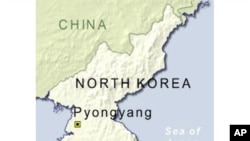When it comes to North Korea, the world has come up with a lot of labels, including "the last bastion of Stalinist Communism." But the author of a new book says North Korea can best be understood through the lens of its racial views. VOA Seoul correspondent Kurt Achin spoke to Brian Myers, author of The Cleanest Race.
Myers specializes in North Korean propaganda at Dongseo University in Busan, South Korea. He says much of the world is mistaken in how it views North Korea's politics.
"The common notion of North Korea as a hard-line communist state is wrong... what I refer to it as is race-based paranoid nationalism," he said.
In his new book, Myers describes North Korea's core race beliefs as a legacy of Japanese colonial rule in the early 20th century.
"After an initial period in which they brutally tried to stamp out all Korean feelings of pride in their nation, the Japanese decided to co-opt it. They did this by saying 'you Koreans, and we Japanese, we are all part of a uniquely pure race, a uniquely ancient race, that goes back thousands and thousands of years, to the same divine progenitor," he explained.
The Japanese left when Tokyo was defeated in World War II, says Myers, but North Korea kept key pillars of their ideology.
"The Korean people, because they are so racially pure, because they are so homogeneous, are morally superior to all other peoples, not tainted by outside influences which, according to the North Korean world view, are inherently evil," he said.
A distinguishing feature of the North's ideology, says Myers, is its extreme distrust of the outside world.
"Where the Japanese people believed that their racial purity and their virtue had always protected them from outside invasion, think of the kamikaze, for example, the 'divine winds,' the Koreans believed that their virtue had made them uniquely vulnerable to attack from outside," he said.
Racism, in Myers's analysis, has helped North Korean leader Kim Jong Il enjoy a relatively strong degree of political legitimacy, despite decades of famine and economic scarcity.
Myers says efforts by the United States and other countries to reconcile North Korea through nuclear disarmament talks are useless. He says depriving the North of its hostile posture toward outside enemies would rob Pyongyang of its only legitimacy, as well as its reason for existing as a separate state from South Korea.










